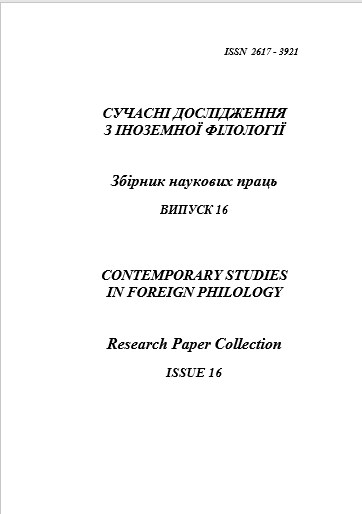ПРАГМАТИЧНІ ОСОБЛИВОСТІ РЕПРЕЗЕНТАЦІЇ ПРЕЗИРСТВА У СУЧАСНОМУ АНГЛОМОВНОМУ ПОЛІТИЧНОМУ ДИСКУРСІ
DOI:
https://doi.org/10.24144/2617-3921.2018.16.%25pАнотація
Анотація. Стаття присвячена проблемі реконструкції концепту презирства як фрагмента мовної картини світу. На матеріалі сучасного англомовного політичного дискурсу досліджено основні когнітивні ознаки, що формують концепт, та проаналізовано прагматичні особливості його вербальної реалізації. Погляд на вербалізатори концептів зводиться до сукупності мовних засобів, які об’єктивують концепт у певному періоді розвитку суспільства. У статті концепт презирство розглядається як емоційний, тобто ментально-афективне утворення, яке характеризується образністю, ціннісністю, має поняттєвий зміст й актуалізується у політичному дискурсі мовними засобами. Дослідження концепту в англомовних політичних текстах проводиться на трьох рівнях лексичних одиниць. Конотативне і денотативне значення емоційно забарвлених одиниць, взаємодіючи і доповнюючи одне одного, формують понятійне поле концепту презирство.
Ключові слова: концепт, презирство, емоція, політичний дискурс, мовна картина світу.
Abstract. The article deals with the problem of the concept contempt reconstruction as a component of language picture of the world. On the material of modern English political discourse the main cognitive characteristics of the concept have been investigated, the peculiarities of its verbal representation have been analyzed. In this paper the concept contempt is regarded as emotional, that is a mental and affective formation which is characterized by imagery and value, has a conceptual content and is verbalized in a political discourse by language means. The analysis of the concept contempt in English political texts has been carried out on the three levels of lexical units. The connotative and denotative meanings of emotive lexemes build up the notional field of the concept contempt. The linguistic study of emotional concepts presupposes the analysis of their nominations, descriptions and verbal expressions. Lexical units of the first level do not contain any additional connotations or intensification of the basic emotion. Lexical units of the second level denote an additional connotative meaning or intensify the basic emotion. Lexemes with amplifying semantic components prevail in political discourse. Lexical units of the third level beyond the basic emotion contain two or more additional connotations that intensify the emotion. The analysis of the concept contempt has been done revealing its nominative linguistic expressions, conveying the meaningful emotional content.
Keywords: concept, contempt, emotion, political discourse, language picture of the world.
##submission.downloads##
Опубліковано
Номер
Розділ
Ліцензія
Автори, які публікуються у цьому журналі, погоджуються з наступними умовами:
- Автори залишають за собою право на авторство своєї роботи та передають журналу право першої публікації цієї роботи на умовах ліцензії Creative Commons Attribution License, котра дозволяє іншим особам вільно розповсюджувати опубліковану роботу з обов'язковим посиланням на авторів оригінальної роботи та першу публікацію роботи у цьому журналі.
- Автори мають право укладати самостійні додаткові угоди щодо неексклюзивного розповсюдження роботи у тому вигляді, в якому вона була опублікована цим журналом (наприклад, розміщувати роботу в електронному сховищі установи або публікувати у складі монографії), за умови збереження посилання на першу публікацію роботи у цьому журналі.
- Політика журналу дозволяє і заохочує розміщення авторами в мережі Інтернет (наприклад, у сховищах установ або на особистих веб-сайтах) рукопису роботи, як до подання цього рукопису до редакції, так і під час його редакційного опрацювання, оскільки це сприяє виникненню продуктивної наукової дискусії та позитивно позначається на оперативності та динаміці цитування опублікованої роботи (див. The Effect of Open Access).

